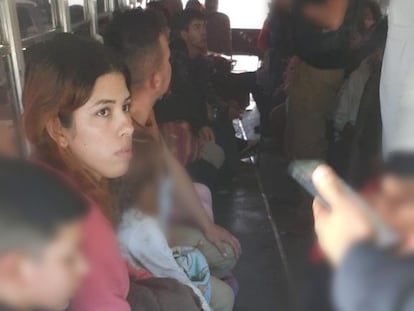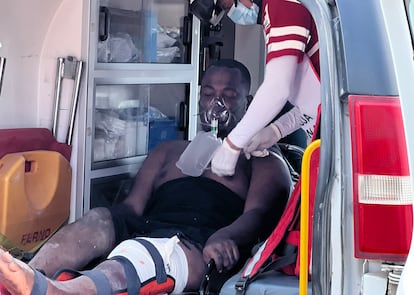The kidnapping (and release) of migrants in Tamaulipas: A case bearing the hallmarks of the Gulf Cartel
President López Obrador acknowledges that the 32 captive migrants were released and not rescued. This is not the first time the criminal group has freed kidnap victims after pressure from authorities

The resolution of the case of the migrants kidnapped in Tamaulipas — in the end there were 32 and not 31 — has raised many doubts. These point to the narrative used by the government, and also to the decisions made by the group of captors, linked in one way or another to the Gulf Cartel. The presidential spokesperson and the secretary of the Interior reported the “rescue” of the migrants on Wednesday, which they said was the result of the efforts of the state and federal security authorities. Nevertheless, rumors quickly surfaced. No such rescue had taken place; their captors had released them in a shopping mall parking lot in the municipality of Rio Bravo, between Reynosa and Matamoros. This Thursday, the Mexican president, Andres Manuel López Obrador, acknowledged that indeed it was a liberation.
The outcome of the kidnapping calls into question the nation itself, from the local to the federal and state levels, and casts doubt on the governability of the northeastern border, immersed in a drawn-out battle between criminal groups. In recent months, there have been constant complaints from activists and religious leaders about the kidnapping of migrants in the area. In addition, confrontations on the highway that connects the notorious municipality of San Fernando with the border, Reynosa and Matamoros, have offered no respite to locals and passersby. In the same location, in July, criminals opened fire on the vehicle in which the secretary of the state government, Héctor Villegas, who had previously been the municipal president of Río Bravo, was traveling.
The explanation that pressure from the security forces may have forced the kidnappers to surrender would seem logical. However, considering what life is like on the northeastern border, the apparent tranquility with which the criminals operate, the reality could have been somewhat more complex. This idea is supported by several details. First, there were no arrests for the kidnapping. And second, there are similar precedents in which the case was settled without arrests, when it was on the national press agenda for consecutive days.
The most significant is the kidnapping of four U.S. citizens in March 2023 in Matamoros, the city where the kidnapped migrants were headed in January, prior to crossing into the United States, where they were supposed to have an appointment with immigration authorities. The case of the Americans was widely publicized, mainly because of the videos of their kidnapping, which took place in broad daylight, after the criminal group responsible had opened fire on them. Two of the four were killed by the gunfire, but the criminals then took their bodies, which were found alongside the survivors four days later, in a shed on the outskirts of the city. The authorities had been at the site a few days earlier.
As is now the case, the Americans’ appearance occurred at the behest of the hijackers who, as revealed in April by The Washington Post, targeted the four Americans “in retaliation for an alleged hit-and-run incident.” The situation has been different this time. López Obrador has reported that the kidnapping of the 32 hostages served an extortive purpose, implying that the kidnappers were planning to demand money from the families of the abductees in exchange for their release. Nonetheless, the criminal group decided to release them. It is not yet known if they were paid before doing so or if they were freed under pressure from the authorities. Or whether there was some kind of negotiation in between.

The parallels go deeper and transcend the voluntary release of the captives and the region in which both events unfolded, where criminality is managed, with varying degrees of institutional support, by the Gulf Cartel. In the case in March last year, the criminal group took it a step further in its surrender and handed over the alleged perpetrators of the murder of two of the four Americans and the kidnapping of the other two. One morning, five men appeared handcuffed next to a plaza in Matamoros. The Gulf Cartel also left a message next to them, asking for forgiveness for the act.
The fact that there were no fatalities in the case of the 32 migrants released, which included Venezuelans, Hondurans, Ecuadorians, Colombians and Mexicans, as reported by the government on Wednesday, suggests a rather different ending. López Obrador has said that Tamaulipas state authorities are investigating the matter, a usual assertion in medium- and high-profile situations. Yet, it is unlikely that anything will transpire. Perhaps tomorrow or the day after, a group of men tied up in a plaza in Rio Bravo will suddenly appear, along with a similar message as in the case of the U.S. citizens. Whether this happens or not, it is unlikely that the truth will be revealed.
In the meantime, the official version, the only one available, takes precedence. López Obrador said on Thursday that the kidnappers freed the migrants due to “a series of factors,” the most important of which was the pressure from the security forces. “They had them in one place and, since there was a large unfolding and the government was involved, they decided to release them,” the president said. “And it’s a good thing they came back safe and sound. Yesterday, when I spoke with the governor, he told me that the first thing he did was to send doctors by ambulance,” he added in reference to Américo Villarreal. “They had them in one place and they took them elsewhere, to the parking lot of a shopping mall, and they have been rescued and they are testifying and we are pleased, very pleased,” he concluded.
López Obrador expressed his discomfort with the narrative of the release. “So much publicity for the regrettable abduction of the migrants,” he said somewhat ironically, believing that any concern about the case actually amounts to political squabbling. This has been a constant in recent years, and the proximity of elections in Mexico accentuates the battle for the narrative of the country’s situation, regardless of the issue being discussed. For the government, any criticism is distanced from objective arguments and is aimed at political purposes, including electoral ones. The president complained that for the opposition — which comprises opposing parties, but also newspapers, reporters and activists — the kidnapping of migrants, the consequences of Hurricane Otis in Acapulco, or the shortage of medicines do not matter. It is all a matter of striking.
Sign up for our weekly newsletter to get more English-language news coverage from EL PAÍS USA Edition
Tu suscripción se está usando en otro dispositivo
¿Quieres añadir otro usuario a tu suscripción?
Si continúas leyendo en este dispositivo, no se podrá leer en el otro.
FlechaTu suscripción se está usando en otro dispositivo y solo puedes acceder a EL PAÍS desde un dispositivo a la vez.
Si quieres compartir tu cuenta, cambia tu suscripción a la modalidad Premium, así podrás añadir otro usuario. Cada uno accederá con su propia cuenta de email, lo que os permitirá personalizar vuestra experiencia en EL PAÍS.
¿Tienes una suscripción de empresa? Accede aquí para contratar más cuentas.
En el caso de no saber quién está usando tu cuenta, te recomendamos cambiar tu contraseña aquí.
Si decides continuar compartiendo tu cuenta, este mensaje se mostrará en tu dispositivo y en el de la otra persona que está usando tu cuenta de forma indefinida, afectando a tu experiencia de lectura. Puedes consultar aquí los términos y condiciones de la suscripción digital.









































